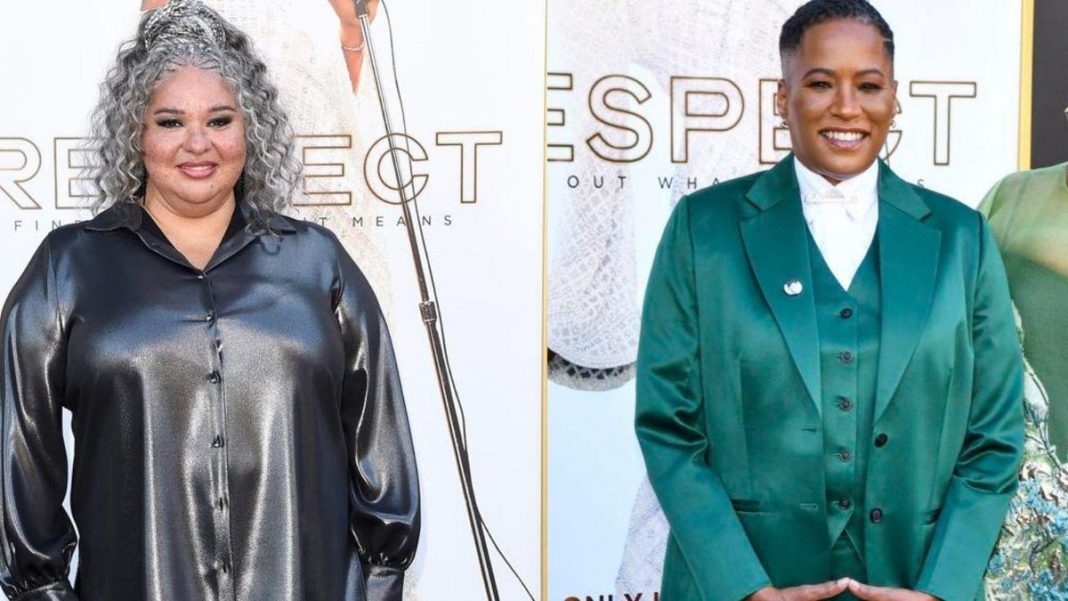LOS ANGELES, CALIFORNIA – AUGUST 08: Tracey Scott Wilson (L) attends the Los Angeles premiere of … [+]
by Rodin Eckenroth/FilmMagic)
Rewind ten years ago and a biopic about the most quintessential voice of our time—Aretha Franklin— probably would have been written and directed by a white male. But this isn’t ten years ago. It’s 2021 and Liesl Tommy and Tracey Scott Wilson are the two black women tasked with telling the story of one of the most iconic black woman of our time and yes they can handle the pressure. “We don’t need white people to tell us who we are anymore,” reflects Tommy, the South African-born director of Respect. Even after many firsts in the TV and film industry over the last several years, a black woman writer director duo on a major film release is still pretty radical. In their film directorial and screenwriting debut Liesl Tommy and Tracey Scott Wilson aren’t just asking, they’re demanding more than a little respect.
NEW YORK – MARCH 16: (L to R) Playwright Tracey Scott Wilson and Director Liesl Tommy attend the … [+]
Getty Images
It started with a text message, remembers Wilson. “It was Liesl Tommy, who I’ve known for twenty something years [who] brought me on to this project. She sent me a text and said, Do you want to write the Aretha Franklin biopic? I said, ‘Are you kidding me?’ She said, ‘No.’ And I said, ‘Yeah,’ recalls Wilson.
Respect chronicles the coming of age of the Queen of Soul—Aretha Franklin from 10 to 29 as she searches to find her own voice and her own way. I [thought], “I know exactly who needs to write this movie,” remembers Tommy. “She’s [Tracey Scott Wilson] one of my oldest friends. We have a short-hand. We’ve worked on meaningful [projects] before. And when it was time, I just sent that text when I knew it was happening,” says Tommy. And Tommy didn’t just stop there. As Toni Morrison once said, “When you get these jobs that you have been so brilliantly trained for, just remember that your real job is that if you are free, you need to free somebody else. If you have some power, then your job is to empower somebody else.” Similarly, when Tommy sent that big ask in a little text message to her friend and colleague Tracey Scott Wilson; she was also ready to unapologetically advocate internally for Wilson to be the one. “I [told her] I will fight to the death for you. Just tell me Yes or no,” declares Tommy.
Political in more ways than one—the film which also places Franklin’s activism front and center was just as political off camera as it was on. But initially, Wilson wasn’t all that cognizant of the political and cultural significance of she and Tommy’s partnership. “You know, because we were in it, [I] actually sort of didn’t process that until other people started pointing it out. We had worked together in theater for so long, so it was always just a black woman team,” says Wilson.” And [Liesl Tommy] was always working with other black artists so it felt normal to us. And then people were like, you know, this doesn’t happen in film, right? And we’re like, oh, okay. It should happen.”
“We have all the skills necessary to do those jobs,” asserts Tommy. “I feel like Tracy [Scott Wilson] and myself, writing and directing this film as black women is groundbreaking still. We are actually making history in the studio realm. And I hope that it is just the beginning.”
LOS ANGELES, CALIFORNIA – AUGUST 08: Liesl Tommy attends the Los Angeles Premiere of MGM’s “Respect” … [+]
FilmMagic
Tommy and Wilson who have history in the world of theater were a perfect duo for crafting a narrative that truly put Aretha Franklin at the center of her own story and not as a victim or peripheral character as we often see in films about women. And it was the precise and delicate point of view that only a black woman can bring to a film that chose to navigate some of the more traumatizing themes in Aretha’s life in an especially artistic and delicate way.
One cannot help but to notice the care and discretion around the depiction of violence on black bodies. Instead of the explicit sexual assault of a young Aretha, audiences see a distorted view of a young girl with a pregnant belly and later two children. Domestic abuse is also often narrated in newspaper articles and through third parties instead of witnessing the explicit violence on screen.
LOS ANGELES, CALIFORNIA – AUGUST 08: (L-R) Liesl Tommy and Jennifer Hudson attend the premiere of … [+]
Getty Images
Moreover, a scene between Jennifer Hudson and Audra McDonald is probably one of the most poignant and emphatic of the film. The scene between mother and daughter is intimate and moving. Tommy recalls, “when we got to that scene, that incredibly emotional scene where she was, you know, living in her struggles, and also her grief over her mother. It was one of those scenes where we had to create a kind of holy environment. You know, I whispered directions. I did not speak loudly. Everybody in the room understood that we have to speak quietly and carefully to create a holy space for all of that emotion,” recalls Tommy.
It is that kind of care and vigilance from both Tommy and Wilson that comes across clearly in Respect. A timeless joyful celebration of a life well lived—the film doesn’t just harp on the difficulties and traumas of Aretha Franklin’s life. But the script also doesn’t skip over them. It’s all there. Respect is undeniably a full, dynamic, depiction of a multi-dimensional but real woman. Respect is now in theaters everywhere.




